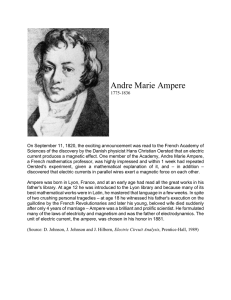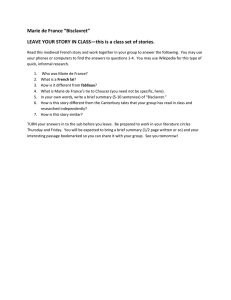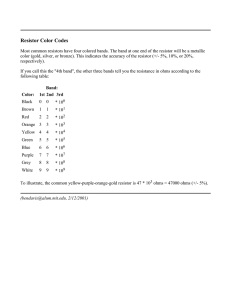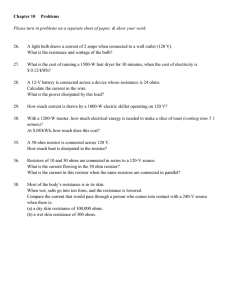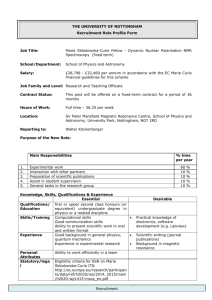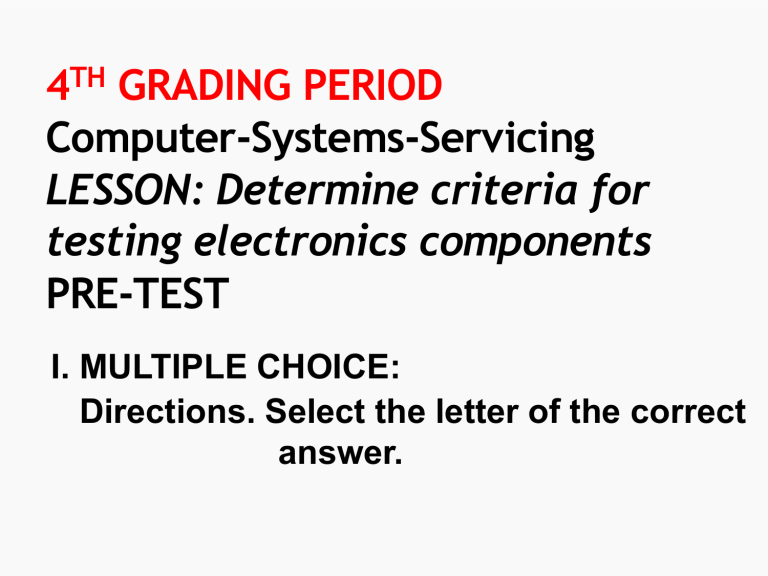
4TH GRADING PERIOD Computer-Systems-Servicing LESSON: Determine criteria for testing electronics components PRE-TEST I. MULTIPLE CHOICE: Directions. Select the letter of the correct answer. 1. The earliest electronic components. They were almost solely responsible for the electronics revolution of the first half of the Twentieth Century. A. Capacitor B. Diode C. Transistor D. Vacuum tube 2. He discovered the principle of electromagnetic induction and invented the electric motor. A. Michael Faraday B. James Prescott Joule C. Lee de Forest D. Konrad Zuse 3. He invented an alternating current (AC) and electrical supply system that includes a transformer. A. Andre Marie Ampere B. Nikola Tesla C. Walter Schottky D. Luigi Galvani 4. Invented by John Bardeen, Walter Brattain and William Shockley. A. Capacitor B. Diode C. Transistor D. Resistor 5. Invented the vacuum tube. In 1902 Lee de Forest developed the vacuum tube amplifier in 1906. A. Ambroise Fleming and Lee De Forest B. John Bardeen, Walter Brattain and William Shockley C. Lee de Forest and George Simon Ohm D. Andre Marie Ampere and James Prescott Joule 6. Who determined the relationship between current and voltage in an electric circuit . A. Andre Marie Ampere B. James Prescott Joule C. Lee de Forest D. George Simon Ohm 7. He developed the first practical inventions in radio telegraphy over long distances. Received the first trans-Atlantic radio signal in 1901. A. Andre Marie Ampere B. Nikola Tesla C. Walter Schottky D. Guglielmo Marconi 8. He discovered that electricity is produced when two different metals are in contact with moistened cloth. A. Andre Marie Ampere B. Nikola Tesla C. Walter Schottky D. Allesandro Volta 9. He is the founders of the science of classical electromagnetism, which he referred to as electrodynamics. A. Andre Marie Ampere B. James Prescott Joule C. Lee de Forest D. Konrad Zuse 10. He credited with the discovery and identification of the electron, the first subatomic particle to be discovered. A. Andre Marie Ampere B. Nikola Tesla C. J.J Thompson D. Allesandro Volta 11. A device or technology that deals with the controlled flow of electrons. a. Electricity c. Drafting b. Electronics d. Computer 12. A component designed intentionally to have a definite amount of capacitance a. Resistor c. Transistor b. Diode d. Capacitor 13. A wire, cable, or other body or medium that is suitable for carrying electric current. a. Insulator c. Circuit b. Conductor d. Dielectric material 14. An instrument that measures the amount of resistance in certain component or circuits. a. Ohmmeter c. Ammeter b. Voltmeter d. Wattmeter 14. An instrument that measures the amount of resistance in certain component or circuits. a. Ohmmeter c. Ammeter b. Voltmeter d. Wattmeter 15. A process of joining two metals caused by heat is called _________ a. Soldering c. Soldering Technique b. Splicing d. Desoldering 16. Jane needs to see the diagram of an electronic circuit with the components represented by their symbol for trouble shooting purposes. Which of the following diagram is being described? A. Pictorial drawing B. Color Code C. Power Supply D. Schematic Drawing 17. Ben was instructed to read the value of this resistor, . Which of the following is used to determine the value of resistors without using a Multi-meter? A. Pictorial drawing B. Tolerance C. Color-Code D. D. Schematic Diagram 18. 10-hope is making a schematic diagram of a certain circuit. He needs to draw a fixed type resistor. Which of the following is it? A. C. B. D. 19. Taehyung is also making his simple schematic diagram; he is going to use LED. Which of the following is the symbol for LED? A. C. B. D. 20. What is the minimum resistance of a 100 ohm resistor with 10% tolerance? a. 90 ohms c. 190 ohms b. 190 ohms d. 210 ohms II. III. Identify the electronic devices on the following selection. A. B. C. D. E. F. G. H. I. J. K. L. M. N. O.
